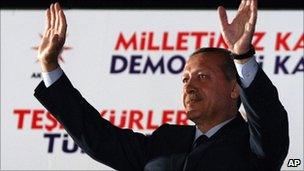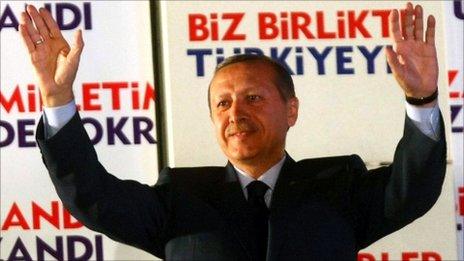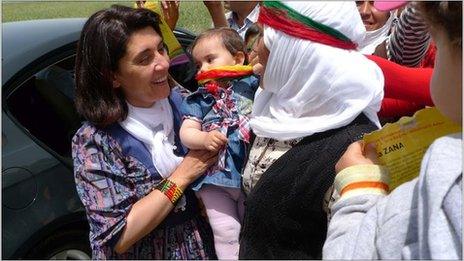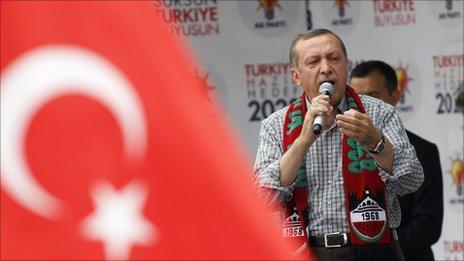Is Prime Minister Erdogan Turkey's new strongman?
- Published
- comments

In the view of many, Mr Erdogan still has to prove he is a true democrat
It is a time when incumbent leaders are being turfed out in Europe and when dictators and autocrats are facing popular resistance across North Africa and the Middle East.
Prime Minister Recep Tayyip Erdogan of Turkey stands out. He is genuinely popular. He is socially conservative, but he has tapped into the aspirational mood of Turkey's middle class.
On Sunday, he was elected to a third term. His party won 50% of the vote. In most places, this would be hailed as a stunning achievement.
The Organisation for Security and Co-operation in Europe (OSCE) said the poll had been well-managed. Turkey remains for many protesters across the Middle East a beacon, a democratic state they can only dream of.
There was, however, a tinge of relief in many circles in Turkey on Sunday. What Prime Minister Erdogan was really after was a two-thirds majority that would have enabled him to change the military-era constitution with a minimum of consultation.
There is the lingering fear that Mr Erdogan is an autocrat in the making. So he was given a victory, but with limits to his power.
Sinan Elgen, of Carnegie Europe, says: "The prime minister has made no secret of his ambition to change the constitution and introduce a US- or French-style presidential system with himself at the helm."
How much tolerance?
The message the electorate sent was to rein him in, to force him to negotiate.
As he embarks on reforming the constitution, he will have to consult with other parties.
Cengiz Aktar, a professor at Istanbul's Bahcesehir University, says we will see if Erdogan is ready for this or whether he "will go his own way and impose his own views on Turkey - in which case we will have difficult times".
The big question that hangs over Mr Erdogan is that he seems uneasy with dissent.
Press freedoms are under strain. The OSCE says Turkey must expand freedoms particularly with the media which needs to be "free from political pressure".
Not least to the EU he will have to demonstrate that he is a true democrat, unafraid of criticism, sensitive to those who are fearful of a creeping Islamist agenda, and a fence-builder with the Kurds.
He has benefited from a booming economy. In 2010, the growth rate was 8.1% and the third highest globally after China and Argentina. But the government will have to reduce the current account deficit and be wary of economic overheating.
Euro fatigue
A new constitution, that guaranteed freedoms, would help in the stalled negotiations to join the EU., external.
There are signs that many Turkish people are losing their enthusiasm for joining the European Union. They have seen their economic power and their influence in the region expand without the bureaucracy in Brussels.
The President of the European Council, Herman Van Rompuy, and the President of the Commission, Jose-Manuel Barroso gave a cautious welcome to Mr Erdogan's victory.
"We are convinced the coming period offers new opportunities for further reforms, including work on a new constitution in the broadest possible consultation and a spirit of dialogue and compromise, and for strengthening confidence between Turkey and all EU member states. Progress in these fields should also give new impetus to the accession negotiations with the European Union," they said in a joint statement.
The mood amongst Europe's voters remains wary towards Turkey. Even though the instinct of Europe's leaders would be against consulting the people, it would be all but impossible to have Turkey join the EU without reflecting whether that is the wish of Europe's citizens.
And that is where the judgement on Prime Minister Erdogan is so important. Is he a modernising democrat - one of the best that the Middle East offers - or is he gradually imposing a socially conservative agenda and is he a strongman in the making, uncomfortable with dissent?
Europe will be watching.
- Published13 June 2011

- Published11 June 2011

- Published10 June 2011
